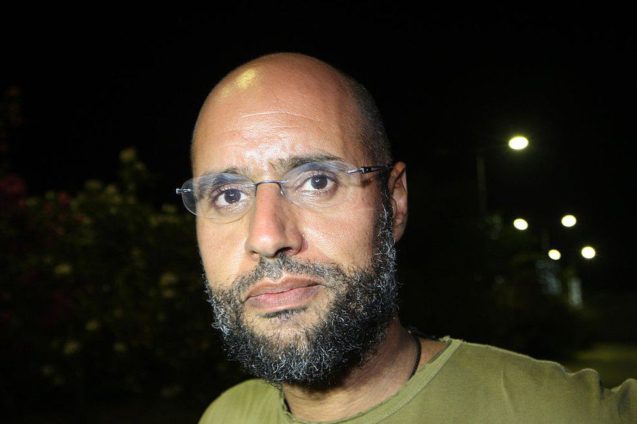The son of Libya's late leader Muammar al-Gaddafi has registered as a candidate in the country's first direct presidential election next month.
Saif al-Islam Gaddafi was once the heir apparent to his father, but his support for a brutal crackdown on protesters 10 years ago tarnished his image.
Since that 2011 uprising, Libya has been riven by conflict.
Rights groups have raised fears the vote, scheduled for 24 December, will not be free and fair.
World powers and the UN secretary-general have warned that anyone who tries to obstruct it or falsify the outcome will face sanctions.
Photos and video circulating online show Saif al-Islam Gaddafi sitting in front of a poster for the upcoming poll, signing electoral papers.
#BREAKING#VIDEO
— Libya Review (@LibyaReview) November 14, 2021
Saif Al-Islam Gaddafi arrives in Sebha to register himself as a presidential candidate.https://t.co/PzK4AXb3CT#Libya pic.twitter.com/YUask5LHmV
Bearded and wearing traditional Libyan clothing, he addressed the camera and cited a verse from the Koran that translates as, "judge between us and our people in truth".
"God always prevails in his purpose," he also said, citing another chapter of the Muslim holy book, and adding from another section - "even if the unbelievers hate it".
It is a very different image from the one he presented before the uprising that brought down his father in 2011.
In the aftermath of Muammar Gaddafi's brutal end, Saif al-Islam Gaddafi was himself captured by a militia.
He was held for six years, receiving a death sentence that was later overturned.
Mr Gaddafi is still wanted on war crimes charges by the International Criminal Court but has gradually re-emerged onto the public stage, including via an interview to the New York Times from his villa in Zintan earlier this year [paywall].
'Divisive but not a surprise'
Mr Gaddafi's comeback has sharply divided opinion in Libya, says BBC Monitoring's Amira Fathalla. Yet there is little surprise at his leadership bid, as he has been repeatedly touted as a contender for years.
Memories in Libya are likely still too raw for him to win the presidency, says the BBC's Middle East editor Sebastian Usher, and his candidacy will further complicate the already fragile electoral process.
After years of civil war and rival powers operating in the east and west of the country, Libya is currently led by an interim government but remains politically unstable.
Disagreement between Libya's political bodies and opposing factions about the election rules and the schedule have threatened to derail the presidential vote.
Other candidates in the running are the warlord Khalifa Haftar - who previously led an insurgency from his eastern base against the UN-backed government in Tripoli, plus Prime Minister Abdulhamid al-Dbeibah and parliament speaker Aguila Saleh.
Latest Stories
-
Let’s prioritize research quality in higher education institutions for industrial growth-Prof. Nathaniel Boso
3 hours -
Herman Suede is set to release ‘How Dare You’ on April 24
6 hours -
Heal KATH: Kuapa Kokoo, Association of Garages donate 120k to support project
7 hours -
KNUST signs MOU with Valco Trust Fund, Bekwai Municipal Hospital to build student hostel
7 hours -
The influence Ronaldo has on people, Cadman Yamoah will have same on the next generation – Coach Goodwin
8 hours -
Gender Advocate Emelia Naa Ayeley Aryee Wins prestigious Merck Foundation Awards
9 hours -
South Africa bursary scandal suspects granted bail
9 hours -
Ecobank successfully repays $500m Eurobond due April 18
9 hours -
Re: Doe Adjaho, Torgbui Samlafo IV, call for Unity among Paramountcies in Anlo
9 hours -
Extortion and kidnap – a deadly journey across Mexico into the US
9 hours -
Rihanna says fashion has helped her personal ‘rediscovery’ after having children
9 hours -
Development Bank Ghana targets GH¢1bn funding for commercial banks in 2024
10 hours -
Shatta Movement apologises to Ghana Society of the Physically Disabled after backlash
10 hours -
Sammy Gyamfi writes: Tema-Mpakadan Railway Project; A railway line to nowhere
11 hours -
Bright Simons: Is the World Bank saving or harming Ghana?
11 hours

